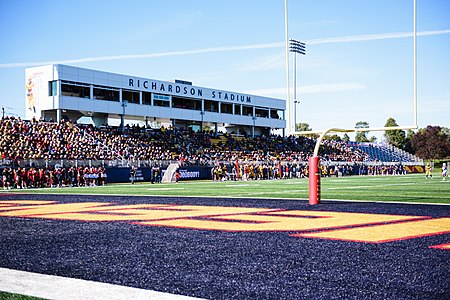Richardson Memorial Stadium

Richardson Memorial Stadium, officially named George Taylor Richardson Memorial Stadium, is the football stadium for Queen's University, in Kingston, Ontario. The stadium is primarily used for Canadian football but also has hosted other sporting events such as soccer and rugby. There has been a stadium at Queen's University since 1921, all using the same name. A second stadium was built in 1971 to replace the first. This was then subsequently replaced in 2016 when the third and most current version was opened. The current stadium has a seating capacity of over 8,000.The facilities are named in memory of George Taylor Richardson, a Queen's graduate renowned for his athleticism and sportsmanship who died in the First World War.
Excerpt from the Wikipedia article Richardson Memorial Stadium (License: CC BY-SA 3.0, Authors, Images).Richardson Memorial Stadium
Hargreaves Way, Kingston
Geographical coordinates (GPS) Address Nearby Places Show on map
Geographical coordinates (GPS)
| Latitude | Longitude |
|---|---|
| N 44.227583 ° | E -76.515794 ° |
Address
Queen's University - West Campus
Hargreaves Way
K7M 2R2 Kingston
Ontario, Canada
Open on Google Maps




